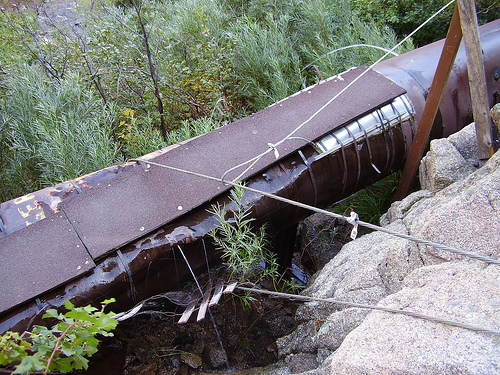Irelands environmental scorecard
Overall, the OECD’s recent report on Ireland’s environmental performance, part of their Economic Survey of Ireland 2009 which was published yesterday (available online as a pdf here), presents a reasonably positive review of the achievements here over the past few years. Indeed the report highlights the fact that ‘Ireland generally has good air and water quality’ and that ‘Energy intensity, or energy use per unit of GDP, is the lowest among OECD countries’.

However, there are a significant number of challenges to be faced, and water quality and efficiency of distribution is not the least of these challenges, as our Galway readers will be only too well aware.
With reported water loss due to leakage in Galway City at almost 50% and the county faring almost as badly, compounded by recent water quality crises in the city and county, it’s clear that water quality and conservation are two of the major challenges facing the region over the coming years. Galway City’s cryptosporidium outbreaks of 2002 and 2007, as well as elevated lead levels in the water supply (Old Mervue) are specifically mentioned in the review. In this context, the OECD report recommends incentives for more efficient use of water resources by introducing charges to households. It seems to me that, given the fact that development levy finance has entirely dried up, and other local authority revenue streams have collapsed, the only way for our local authorities to ensure a safe and efficient water supply in the coming decade is to charge householders this levy. As it is, Ireland is the only OECD country that does not do so.
It will not be easy for our political representatives to convince the public of the need for charges and any charges that may be introduced will have to be carefully priced. Launching the report, Angel Gurría, OECD Secretary-General, had this to say about charges:
‘Coming from Mexico I am very aware of the social concerns that exist about charging people, especially poor people, for their use of water. But there are ways to target support to poorer households to ensure that they have adequate access to water services. Based on past OECD work, countries have used a variety of means for this purpose, including income support, vouchers to cover the cost of a certain amount of water consumption, or volumetric charging where the initial amounts are free or low-cost. Not charging for water use is effectively a subsidy for richer households. It undermines the financial viability of water utilities, and results in inefficient use of this increasingly scarce resource.’
Let’s hope that the Government doesn’t consider privatisation….
This entry was posted on Thursday, November 5th, 2009 at 2:37 pm. It is filed under About Environment and tagged with Charges, environment, Ireland, OECD, Water.
You can follow any responses to this entry through the RSS 2.0 feed.




I know a certain amount of water loss is unavoidable; but 50%? Sweet Lord! While I am not actually opposed to the notion of water rates, that excessive loss will have to be addressed before you can start charging the citizenry.
The highest statistics were recorded in Roscommon where 58.6 per cent of water was unaccounted for….
See this story in todays Irish Times for more shocking stats: http://www.irishtimes.com/newspaper/ireland/2009/1105/1224258100862.html
Maybe the citizenry should revolt and only pay half the bill…
I’m in Brussels for meetings at the European Commission, where another seven cases are being considered against Ireland for failing to protect SACs and SPAs, and for failing to fully implement EIA and SEA directives. Needless to say, many in the EC are less than impressed with the OECD report…
I can see the headline now:
“People of Mervue are revolting”
I’ve said it for years.